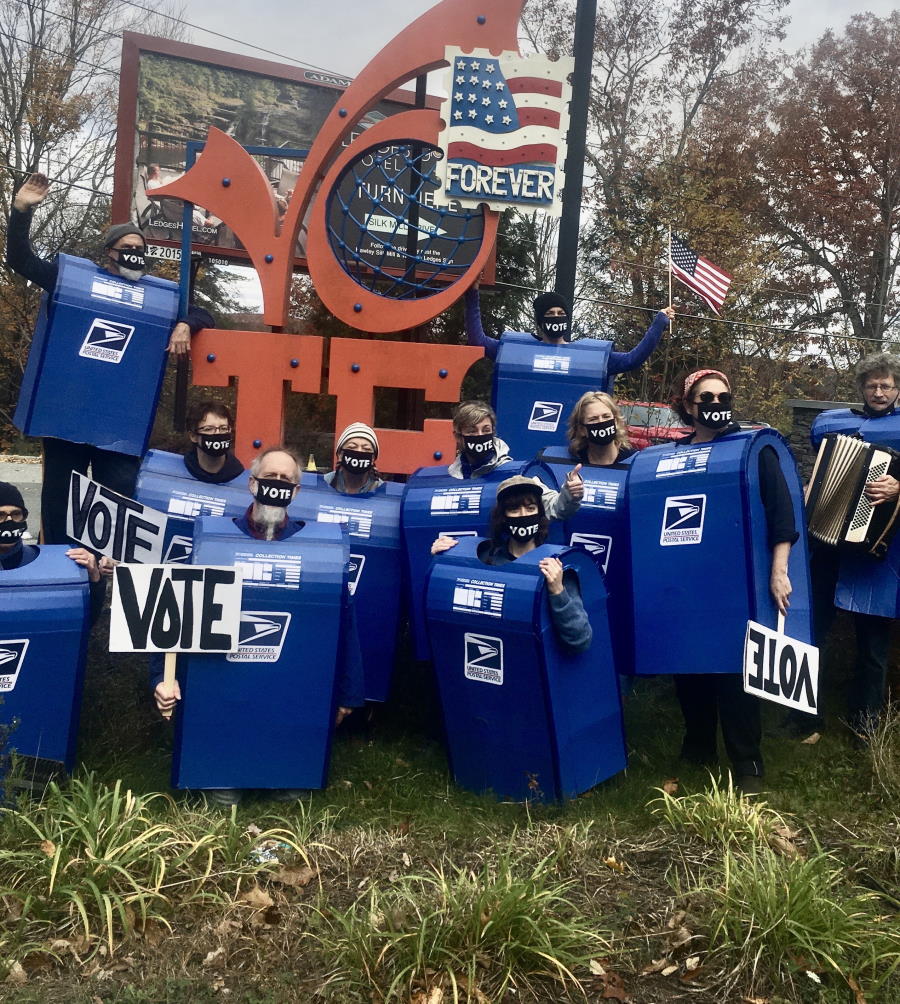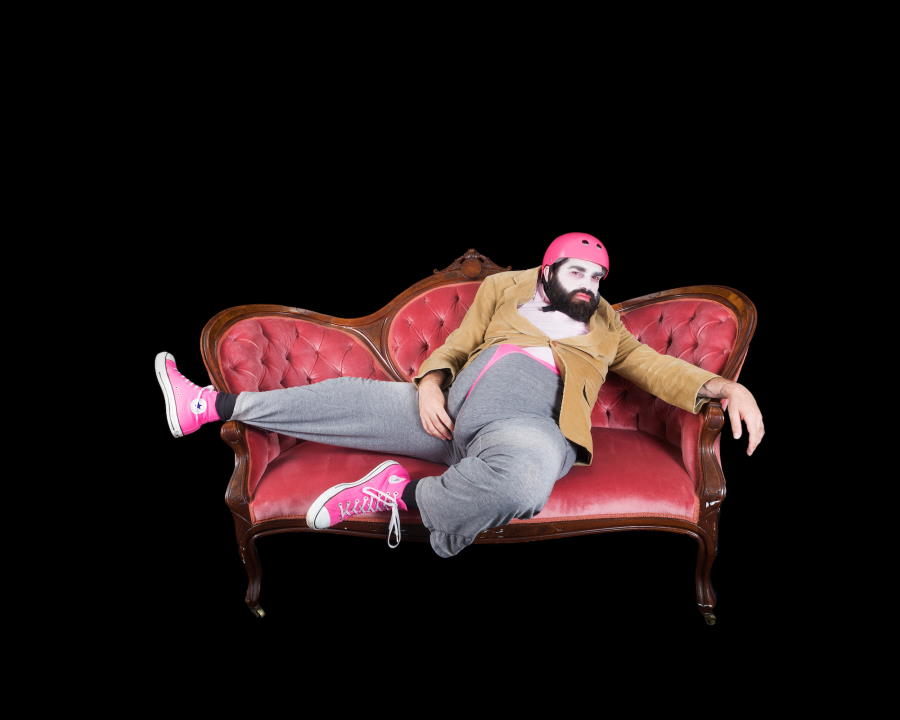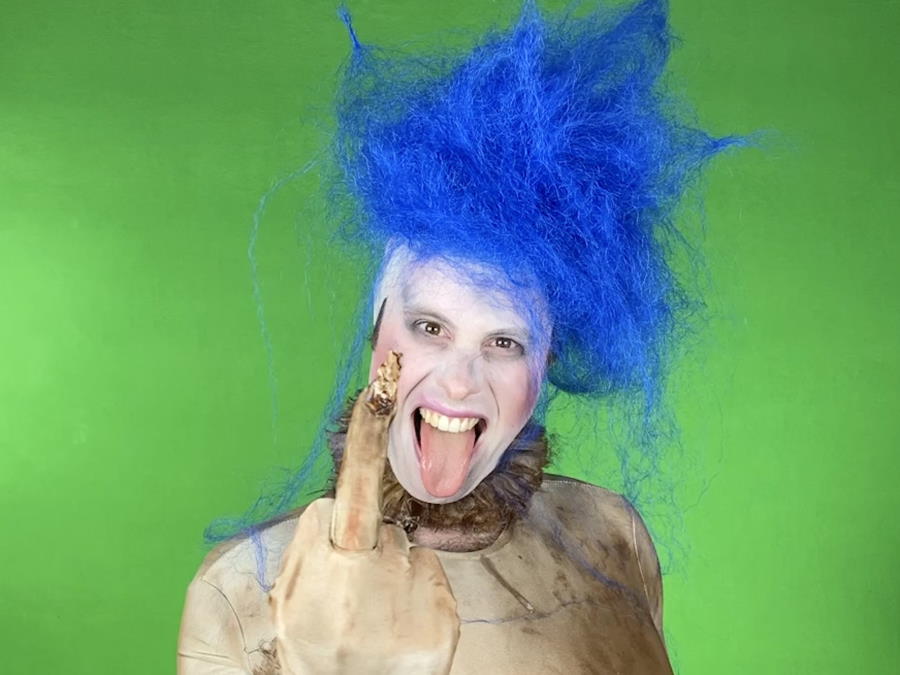A white van with the word DEMOCRACY painted on the side breaks down in the middle of an L.A. intersection, forcing a costumed pair of Lady Liberties to beg for assistance from passersby. A row of dancing mailboxes on the outskirts of Philadelphia hands out literature on voting by mail to whomever stops to watch. On a virtual stage, a bouffon-inspired troll in an electric-blue wig capers and drools at its captive audience from behind the screen, provoking laughter and unease in equal measure.
Last year may have been a dark time for theatre, but it provided fertile ground for activist clowns, who emerged in full force to create what L.M. Bogad (he/him) describes as “the irresistible image”—i.e., a narrative image so compelling that it’s reproduced and disseminated even by entities who oppose or mock its messaging. An inspired onslaught of creative intervention deployed in support of broader movements.
Bogad—a professor of political performance at UC Davis, and author of Tactical Performance: The Theory and Practice of Serious Play (Routledge 2016)—devised the Delivering Democracy mailbox performances with support from the Center for Artistic Activism, first in Pennsylvania and later in Berkeley. They both made a case for the safety and availability of voting by mail, and disarmed detractors with their goofy but irrefutable charm. While not everyone they encountered was swayed by their message, Bogad admits, they also didn’t encounter any aggressive pushback. That’s mainly because, Bogad points out, arguing with a clown in a mailbox costume can only make the detractor look foolish themselves.
Meanwhile in L.A., Operation Project took to the streets, co-founded by Blair Bogin, John Gilkey, and Amrita Dhaliwal of Idiot Workshop. Inspired in part by creative action toolkits compiled by Beautiful Trouble and the Center for Artistic Activism, their “Broken Democracy” van rolled through Los Angeles in the weeks preceding the November 2020 elections, provoking responses that ranged from delighted to enraged. For Dhaliwhal (she/her), who recently co-curated a series of interviews and essays about activist clowning with Nathaniel Justinano on HowlRound, part of the power of the action was the unspoken subversion of having herself, a woman of color, and Max Baumgarten, a cisgender white man, both playing the role of “Liberty,” to propagate the idea, Dhaliwal elaborates, “that Lady Liberty could be many identities.”

For Nathaniel Justiniano (he/him)—artistic director of Naked Empire Bouffon Company, and an assistant professor of comedic arts at Emerson College—these kinds of physical and public disruptions are particularly suited for the exaggerated, merciless bouffon persona of which he is a skilled practitioner and seasoned instructor. Consummate social critics, bouffons are not afraid to be confrontational in their approach, and, unlike other clowns, are never the punchline to their own gags.
“Bouffons never lose their status,” Justiniano says of the form. “They’re outsiders, so they have this really interesting, fabulous perspective on the inside of society, and from that perspective can say the sharpest, most penetrative truths.”
This can be just as true onstage as on the streets, and Naked Empire has specialized bringing bouffon to small theatres across the country and internationally since 2009. Currently working with company member Sabrina Wenske on a piece called Karen, tackling “white supremacist delusion among white women,” the troupe has previously staged such works as You Killed Hamlet, an inquiry into death and its rituals; You Fucking Earned It, which took on Western consumerism; and Do What You Love, which skewered the self-actualization industry.
“One of things that we’re stepping into with this work is our relationship to power,” Justiniano told a recent workshop on activist clowning, hosted by Robyn Hambrook and the U.K.’s Online Clown Academy. By encouraging his students to explore the interior lives of everyday objects and concepts to get at their “truth,” he demonstrates how even social constructs and frameworks, such as racism, capitalism, and heteronormativity, have shapes of their own, and how their status can be played with and subverted via bouffon.
But for Justiniano, social satire isn’t the only path to activism. As an instructor he wants his students to become fluent in anti-racist, anti-oppression practice as well. At that same workshop he first led the group in a land acknowledgment, and also spoke at length about his own proximity to whiteness, his light-skin privilege, the fact that the majority of the workshop participants—although an international cohort—were still predominately white.
“It’s about modeling,” he says of this directed transparency. Naming the unmentioned also describes the work of bouffon. “We must stop believing that we’ve done all that we can to create spaces that cultivate safety and thriving for all, when there is no evidence to that,” he points out about the kinds of conversations and strategies he wants to provoke in the field.

Another company making use of various clown techniques in the service of creating social and political commentary is New York’s Fake Friends, whose raucous Circle Jerk was a highlight of 2020’s shift to virtual theatre programming. When Patrick Foley (he/him) appeared onscreen as his bouffon-inspired troll character, I immediately sat up and paid attention. Jarring, playful, and irreverent, the troll embodied the spiteful energy that underlies so much of our social media discourse, giving what Justiniano might call the “shape” of the internet a physical form.
“The piece was always concerned with the online, so it felt important to have a hyper-embodied character who was able to physicalize the more destructive, grotesque impulses of the other characters,” Foley explains about the troll’s inclusion. “The mockery of the bouffon, the confusion it can engender in an audience trying to figure out what exactly they’re looking at, and its power to destabilize the spectator, felt particularly resonant with the plight of two white gay supremacists who create an AI Influencer to turn the world gay,” he says, neatly summarizing the play’s premise.
And while only the troll appeared to work in a bouffon mode in Circle Jerk, a compelling case could be made for the piece’s other characters as being clowns of a sort, trapped inside their exaggerated alternate timeline, jockeying for top dog status, with no way to avoid their ultimate fate.
While clowns have been playing with power dynamics and social constructs in their work for centuries, a renewed recognition of the outsized role these constructs play in our lives—amid a pandemic, racial justice protests, climate change, and ongoing inequality—makes this an ideal time for clowns to step forward and challenge them. From creatively deployed street actions to staged interventions to scripted takedowns, clowns have the will, the wit, and the fearlessness to tackle the big issues of our time. And as theatremakers are still trying to find their footing in a changing theatrical ecosystem, looking to performance modes already well-suited to disrupting models and disregarding norms may be a way to generate work that can dismantle and reimagine those norms.
In other words: time to send in the clowns.
Nicole Gluckstern (she/her) is an arts administrator, dramaturg, and journalist.


